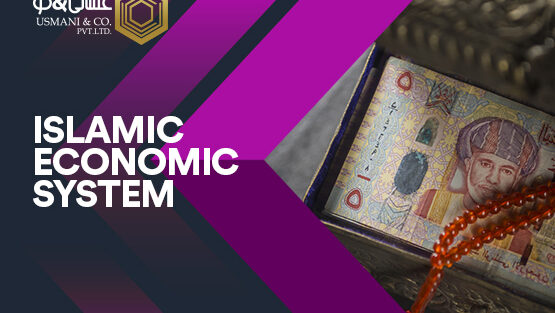The Islamic Economic system is a system which is in conformity with the rules of Shariah. Sharia h can be explained as a “Pathway to be followed ” and can
Further, be explained as a set of divine injunctions and laws that regulates every aspect of a human being in their individual and collective lives. All aspects of the individual and collective life of a human being can be divided into five categories. Thus, Shariah a pathway to be followed in all these five categories.
The five categories are:
1) Beliefs (Aqaid]
7) Acts of Worship (Ibadat)
3) Dealing with others (Muamlaat)
4) Manners (Ikhtaqiat )
5) Economics {Maistiat)
The nature of Shariah rulings are followed:
Halaal – All those acts that are permitted and declared lawful by Shariah.
Haraam – All those actions that are prohibited and declared unlawful by Shariah and their impressibility is derived from either the Holy Quran, Hadiths Mutawatir, or Ijma. Sunnah e Mutawaatirah as the strongest narrations of the Holy Prophet P.B.U.H. in terms of their narrators, i.e. the narrators are in such a large number that is impossible for all of them to have agreed on a false issue.
Faraz – All those actions that are declared mandatory by either Quran or Sunnah e Murawaatirah or Ijma.
Wajibaat – All those actions that are declared mandatory on Muslims by the narrations which are not as strong in terms of narrators as-Sunnah Mutawaatirah.
Sunnah – All those actions that are recommended to be performed by Muslims, based upon the association of those actions with Holy Prophet P.B.U.H.
Nawafil (All those actions that are made optional and rewardable on Muslims by Shariah).

Sources of shariah
The rules and regulations laid down by Islamic Shariah are derived from the following sources:
Quran
Hadith
Ijma
Qiyas
Ijtihad
Quran
Quran is the word of Allah Ta’ala revealed over Prophet Muhammad P.B.U.H. The Holy Quran is the primary source of knowledge and Shariah rulings for Muslims. The injunctions mentioned In the Holy Quran are mandatory to follow and anyone who denies express injunctions of the Holy Ouran is regarded as Non-Muslim. Most of the injunctions mentioned in the Holy Quran are prescriptive in nature such as Order for offering Salah but information about the method and other descriptive information about offerIng salah may be obtained from other sources of Shariah such as-Sunnah:
”And obey Allah and His Messenger; if you are believers.” (8.’1)
Sunnah
Sunnah is defined as a word spoken of the act done or rectified by the Holy Prophet P.B.U.H. The Sunnah provides detailed information about the code and conduct of every sphere of life and Is also considered as Divine Revelation. The details about Sunnah are preserved in
The form of Ahadith. On the basis of clear Injunctions of Holy Quran. Sunnah can thus be regarded as the second source of Islamic Shariah after the Quran e.g Rules for Riba al Fadal has been extracted from Sunnah.
Ijma
Ijma means the consensus of scholars of Ummah on a particular issue. It is one of the most authoritative sources of Islamic Shariah since it encompasses the unanimous opinion of the scholars of a particular era over the interpretation of the Quran and Hadiths on some particular issue. The status of ljrma as an authoritative source of Sharlah has also been ascertained from the following saying of Holy Prophet P.B.U.H.
“My Ummah shall never be, combined on an error.”
Qiyas
Qiyas means to apply a recognized rule of Shariah expressly mentioned in the Holy Quran and Sunnah, to a similar thing or situation by way of analogy.
Ijtihad
Ijtihad literary means “Utmost Effort” and technically it means to exert utmost effort to discover the ruling of Shariah regarding a particular situation. The practice at Ijtihad has been duly endorsed by the Prophet Muhammad P.B.U.H in the following Narration:
”When the Holy Prophet P.B.U.H intended to send his companion Mu’adh, to Yemen as a ruler and as a judge. He asked him: How will you adjudicate a matter when it will come to you?”
He said, “I shall decide on the basis of Allah’s Book (the Holy Quran).”
The Holy Prophet P.B.U.H. asked, “if you do not find it in Allah’s Book (what will you do)?”\
He said: “then, on be the basis of Sunnah of Allah’s Messenger.:
“If you do not find it even in the Sunnah of Allah’s Messenger (what will you do)?’ The Holy Prophet asked.
He replied: “I shall make Ijtihad on the basis of my understanding And will not spare any effort (to reach the truth).”
On This, the Holy Prophet P.B.U.H tapped the chest of Hazrat Mu’adh, with happiness and said, “Praise be to Allah, who has let the messenger of the messenger of Allah to do what pleases Allah’s messenger”. (Abu Dawood, Hadith Ho. 3592).
It is an important and often misunderstood question whether the doors of ijtihad are still open or not. For all those issues where there are clear injunctions of the Holy Quran, Sunnah, and Ijma, Ijtihad cannot be done on those issues. IjtIhad can only be done on those new issues and situations where no explicit injunctions of Shariah are available or there are some meticulous changes that require further exploration of the issue by the Scholars.
It is also important to note that Ijtihad is not merely one’s own opinion based on rational judgment- but it is indeed the result of the unbiased and utmost effort of Mujtahid on the basis of principles laid down by Shariah and it must not contradict with any clearly defined rules of Islamic Shariah. On the basis of complex nature of Ijtihad, not every scholar can perform Ijtihad but only the most learned, senior and the pious Of the scholars are eligible for the role of Mujtahid who have in-depth knowledge and understanding of Quran, Tafasir Arabic, Background of the revelation of verses of Quran, Ahadith, Usool e Fiqh, etc.
Introduction of Islamic Economics
One of the forms nf capitalism, that has been flourishing in non- Islamic societies of the world is the interest-based investment. They are normally two participants in such transactions. One is the Investor who provides capital as on loan against interest and the other is the Manager who runs the business. The Investor has no concern whether the business runs into profit or loss, he automatically gets an interest (Riba) in both outcomes at a fixed or variable rate on his capital. Islam prohibits this kind of business And the Holy Prophet P.B.U.H enforced the ruling, not in the form of some moral teaching, but as the law of the land in Islam.
It is very important to know the definition and forbidden Of Riba and the injunctions relating to its unlawfulness in all respects. On one hand, there are severe warnings of the Qur’an and Sunnah against it and on the other, it has become an integral part of the world economy today. The desired liberation from Riba seems to be infested with difficulties as the problem is very complex, detail-oriented, and has to be taken up in all possible aspects.
First of all, we have to deliberate Into the correct interpretation of the Quranic verses on Riba and what has been said in authentic ahadith and then determine what Riba is in the terminology of the Quran and Sunnah, which transactions It covers, what ts the underlying wisdom behind its prohibition and what sort of harm it brings to the society. We will start by looking at the economic philosophy of Islam via-a-vis interest.
The Economic philosophy of Islam vis-a-vis Interest
The economic philosophy of Islam has no concept of Riba because according to Islam, Riba is that curse in society, whIch causes wealth to accumulate among a handful of people and it results inevitably in creating monopolies, opening doors for selfishness, greed, injustice, and oppression.
In an interest-based economy, deceit and fraud prosper in the world of trade and business. Islam, on the other hand, primarily encourages highest moral ethics such as universal brotherhood, collective welfare, and prosperity, social fairness, and justice. Due to this reason, Islam renders Riba as absolutely haram and strictly prohibits all types of interest-based transactions. The prohibition of Riba in the light of the economic philosophy of Islam can be explained vis-a-vis distribution of wealth in a society.
Distribution of Wealth
The distribution of wealth is one of the most important and most controversial subjects concerning the economic life of man, which has given birth to global revolutions in today’s world and has affected every sphere of human activity from international politics down to the private life of the individuals. For many centuries now, this question has no one been the center of fervent debates, but also of armed conflicts. The fact, however, remains that whatever has been said on the subject without seeking guidance from Divine Revelation and relying merely on human reason has had the sole and inevitable result of making the confusion worse confounded.
Islamic Perspective of Distribution of Wealth
Here we convey the point of view of Islam regarding the distribution of wealth as extracted from the Holy Qur’an, the Sunnah, and the writings of the Shariah research scholars. But before explaining the point, it is imperative to clarify certain basic principles which distinguish the Islamic point of view about economics from the non-Islamic point of view.
The Importance of the economic goals
No doubt, Islam is opposed to monasticism and views the economic activities of man quite lawful, meritorious, and some times even necessary and obligatory. It acknowledges the economic progress of man and considers a Lawful and righteous livelihood an obligation on every individual. Notwithstanding all this, it is no less a truth that it does not consider “economic activity” to be the basic purpose of man, nor does it view economic progress as the be-all and end-all of human life.
Many misunderstandings about Islamic economics arise just from be confusion between the two facts i.e. considering economics as the ultimate goal of life and further considering it as a necessity in order to have a prosperous life through lawful means. Even human logic can comprehend to show that activity being lawful, or meritorious or necessary is different from it being the ultimate goal of human life and the center of thought and action. It Is, therefore, very essential to make this distinction as clear as possible at the very outset. In fact, the profound, basic, and far-reaching difference between Islamic economics and materialistic economics can be summarized as:
Arcording to materialistic economics:
“Livelihood is the fundamental problem of man and economic developments are the ultimate end of human life.”
While according to Islamic economics:
“Livelihood Is necessary and Indispensable, but cannot be the true purpose of human life. “
So, while we find in the Holy Quran, the disapproval of monasticism and the order to:
”Seek the grace of Allah.”(62:10).
At the same time, we also find in the Quran to restrain frum the temptations of wo Idly life. And all these worldly things in their totality have been designated as “Ad-Dunya” (“the mean”) – a term which, in its literal sense, does not have a pleasant connotation.
Apparently, one might feel that the two commands are contradictory, but the fact is that according to the Quranic view, all the means of livelihood are no more than just stages of man’s journey, his finaI destination lies beyond them. The success in this ultimate destination is achieved by good intentions and through rightful means of earning livelihood in this world.
The real problem of man and the fundamental purpose of his life is the attainment of these-two goals. But one cannot attaln them without traversing the path of this world. So, all those things too which are necessary for his worIdly life, become essential for man. It comes to mean that so long as the means of livelihood are beIng used only as a path leading towards the final destination, they are the benevolence of Allah, but as soon as man gets lost in the mazes of this pathway and allows himself to forget his real destination, the very same means of livelihood turn into a “temptation” or into a “triaI”:
“And be a ware that your possessions and your children are but a trial.” (8:28).
The Holy Quran has enunciated this basic truth very precisely in a brief verse:
“And seek the betterment of the) Ultimate Abode with what Allah has given to you.” (28:77).
This principle has been stated in several other verses too. This attitude of the Holy Quran towards “the economic activity” of man and its two aspects would be very helpful in solving problems of man in Islamic economics.
The Real Nature of Wealth and Property
The other fundamental principle, which can help solve the problem of the distribution of wealth, is the concept of ’wealth’ in Islam. According to the illustration of the Holy Quran, ’wealth’ in all its possible forms is a thing created by Allah, and is, in principle His “property”. Allah delegates the right of His Property over a thing. which accuses to man, to Him. The Holy Quran explicitly says:
According to.the Holy Quran, the reason for this philosophy is that al a man can do is invest his Iabor into the process of production. But Allah alone, and no one else, cam cause this endeavor to be fruitful and actually productive’. Man can do no more than sow the seed in the soiI, but to bring out a secdIing from the seed and make the seedling grow into a tree is the work of someone other than man. The Holy Quran says:
“Well, tell Me about that (seed) which you sow; (63) is it you who grow it, or are we the one who grows? 64” [56:63”64]
And in another vorse:
“Did they not see that We have created for them cattle, among things made (directly) by our hands, and then they become their owners? (35:71).
All of these verses throw ample light on the fundamental point that “wealth”, no matter what its form, is in principle “the property of Allah”, and it is He who has bestowed upon man the right to exploit. So Allah has the right to demand that man should subordinate his exploitation of this wealth to the commandments of Allah.Thus, man has the “right of property” over the things he exploits but this right is not absolute or arbitrary or boundless, it carries along with it certain limitations and restrictions, which have been Imposed by the real Owner of the ‘wealth’, We must spend it where Allah has commanded it to be spent, and refrain from spending it where Allah has forbidden. This point has been clarified more explicitIy in the following verse
’And seek the (betterment of the) Ultimate Abode with what Allah has given to you, and do not neglect your share from this world, ond do good as Allah did Good to you, and do not seek to make mischef in the lond.” (28:77)
This verse fully explains the Islamic point of view on the question of property. It places the following guidelines before us:
Whatever wealth man possesses has been given by Allah.
Man has to use it in such a way that his ultimate purpose should be to seek the bountles and blessings of Allah in this world nnd hereafter.
Since wealth has been given by Allah, its use by man must necessarily be subject to the commandment of Allah.
Now, the Divine Commandment has taken two forms:-
Allah may command man to convey a specified production of ”Wealth° to a not her ma n. This Commandment must be obeyed, because Allah has done good to you, so He may command you to do good to others — “do good as Allah has done good to you
He may forbid you to use this ”wealth” in a specified way. He has very right to do so because He cannot allow you to use “wealth” in a way which is likely to produce collective ills or spread disorder on the earth.
This is what distinguishes the Islamic point of view on the question of property from the Capitalist and Socialist point of view. Since the mental background of Capitalism is (theoretically or practicaly) materialistic, it gives man the unconditional and absolute right of property over his wealth, and allows him to employ it, as he Iikes But the Holy Quran has adopted an attitude of disapprobation towards this theory of property, in quoting the words of the nation of Hazrat shu’aib. They used to say:
“Does your Salah {prayer) command you that we should forsake what our fathers others used to worship or that we should not deal with our wealth as we please?” (11:87).
These people used to consider their property as really theirs or “Our property”, and hence the claim of “doing what we like” was the necessary conclusion of their position. But the Holy Quran has, in the chapter ” Light” substituted the expre Psion “Our possessions” for the term “the property of Allah “, and has thus struck a blow at the very root of the Capitalistic way of thinking. And at the Same time, by adding the qualification “that Allah has bestowed upon you”, it has cut the roots of socialism as well, which starts by denying man’s right to private property. Similarly,
“thus they acquired the right property over them”
A verse in the Chapter “Seen”, explicitly affirms the right to private. property as a lift from Allah.
Difference betwéen lslam, Capitalism end Socialism.
Now we are in a position to draw clear boundary lines that separate Islam, Capitalism and 5ocialism from one another. Capitalism affirms an absolute and unconditional right to private property whereas SociaIIsm totally denies the right to private property.
But the truth however, lies between these two extremes – i.e, Islam admits the right to private property but does not consider it to be an absolute and unconditional right that is bound to cause.”dis rder on the earth”.
Written by: Dr. Muhammad Imran Usmani
DISCLAIMER: Copyrights are reserved by Usmani and Co.



